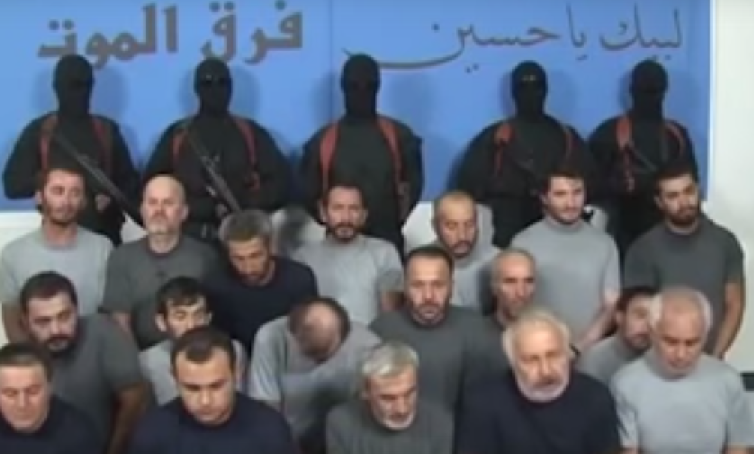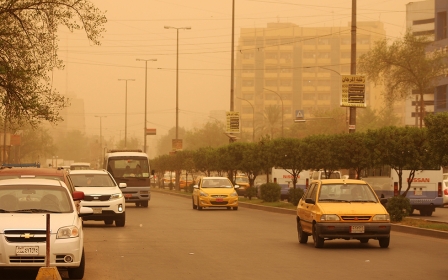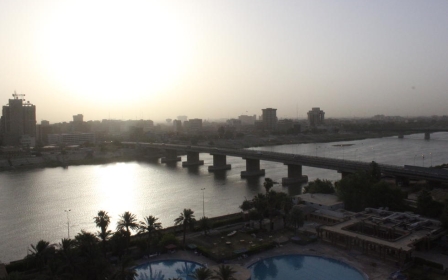Kidnapping of 18 Turks in Iraq claimed by unknown militants

An unknown militant group has claimed the kidnapping of 18 Turkish workers in Iraq and issued a list of demands it said Ankara must fulfil for them to be released.
Gunmen seized 18 employees of major Turkish construction firm Nurol Insaat on 2 September in the Sadr City area of northern Baghdad, where they were working on a football stadium project.
In a video posted online, men armed with submachine guns and wearing black uniforms, sunglasses and balaclavas stood behind men said to be the kidnapped Turks.
The men, who were dressed in grey and blue T-shirts, did not appear to have been harmed.
The militants identified themselves as "Furaq al-Mawt," or "Death Squads," in text appearing behind them alongside the words "We are at your service, O Hussein."
One of their demands was that Turkey order rebel forces to stop besieging four Shia-majority villages in northern Syria.
The group's makeup and provenance were not immediately clear. Their demands would seem to indicate that the militants are a Shia group, but they could also be trying to mislead the public about their identity.
The demands, addressed to Turkish President Recep Tayyip Erdogan, included Ankara stopping "the flow of militants from Turkey to Iraq," and "the passage of stolen oil from Kurdistan through Turkish territory".
Iraq's autonomous Kurdish region is independently exporting oil via Turkey in a move the federal government considers illegal and one which has become a point of contention between Baghdad and Ankara.
"If Erdogan and his party do not respond, we will crush Turkish interests and their agents in Iraq by the most violent means," the group said.
Over the past 18 months, dozens of Turks have been kidnapped, but later released in Iraq by the Islamic State (IS) militant group, which overran large parts of the country last year.
Clashes during search
Sadr City is a stronghold of Shia paramilitary forces opposed to IS.
A soldier was killed last week when security forces clashed with the Shia Ketaeb Hezbollah militia while searching for a person allegedly involved in the kidnappings.
The security command responsible for the capital said there had been intelligence that "one of the members of the gang that carried out the kidnapping" was on Baghdad's Palestine Street.
It did not identify the gunmen, but Al-Etejah television, which is affiliated with Ketaeb Hezbollah, said one of the group's facilities had been attacked by the Baghdad Operations Command.
Baghdad turned to mostly Shia volunteer forces for support as IS advanced towards the capital in June 2014. Those groups have played a key role in halting and then reversing the militants' gains.
In doing so, the government empowered Shia militias, some with chequered human rights records, and spurred the creation of new ones, allowing them to act with near-impunity despite the fact that the officially fall under government command.
Some fighters linked to the militias stand accused of criminal activities, including kidnapping, property seizure and murder.
Kidnappings for ransom are a persistent problem in Baghdad, although political motives also come into play.
Ankara has been accused of complacency towards IS and complicity in assisting the group, which also holds substantial territory in neighbouring Syria.
It backs the mostly Sunni rebel forces battling to overthrow Syrian President Bashar al-Assad, while Iraqi Shia have fought alongside his troops.
New MEE newsletter: Jerusalem Dispatch
Sign up to get the latest insights and analysis on Israel-Palestine, alongside Turkey Unpacked and other MEE newsletters
Middle East Eye delivers independent and unrivalled coverage and analysis of the Middle East, North Africa and beyond. To learn more about republishing this content and the associated fees, please fill out this form. More about MEE can be found here.




